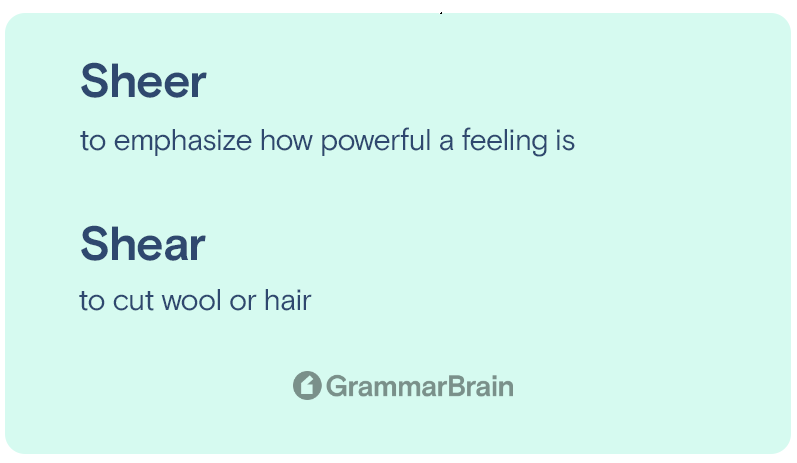‘Shear’ and ‘sheer’ are homophones, meaning words that sound similar despite having different meanings. Due to this very reason, both these words are frequently confused even by experienced writers. Today, we will learn the differences between ‘shear’ and ‘sheer’.
Source of confusion between ‘Sheer’ and ‘Shear’
The primary reason behind the confusion between ‘sheer’ and ‘shear’ is their similar pronunciation and their almost identical spelling.

‘Sheer’ Meaning and Definition
Depending on the context, ‘sheer’ can be used either as an adjective, an adverb, or a verb.
1- Adjective 1: According to the Cambridge dictionary, ‘sheer’ as an adjective is “used to emphasize how very great, important, or powerful a quality or feeling is.” It might also mean “nothing except”.
2- Adjective 2: According to the Cambridge dictionary, ‘sheer’ can also be used as an adjective that denotes something “extremely steep or almost vertical”.
3- Adjective 3: According to the Cambridge dictionary, “Sheer clothing or material is so thin, light, and delicate that you can see through it”.
4- Adverb: As an adverb, ‘sheer’ might mean ‘completely’ or ‘altogether’.
5- Verb: According to the Cambridge dictionary, ‘sheer’ as a verb means “to change direction suddenly.” It might also mean ‘to deviate from a course.
‘Shear’ Meaning and Definition
Depending on context, ‘shear’ can be used either as a verb or as a noun.
1- Verb 1: According to the Cambridge Dictionary, ‘shear’ as a verb means “to cut the wool off a sheep”. Alternatively, it also means “to cut the hair on a person’s head close to the skin, especially without care.”
2- Verb 2: Another meaning of ‘shear’ as a verb is the breaking of a part of something, mainly made of metal, into two pieces, due to a sideways force.
3- Noun: According to the Cambridge dictionary, ‘shear’ as a noun means “movement in the plates in the surface of the earth that causes them to change shape or break”.
Difference between ‘Sheer’ and ‘Shear’
The differences between ‘sheer’ and ‘shear’ can be summarized as follows:
1- ‘Sheer’ is mostly used as an adjective or adverb. While ‘shear’ on the other hand, is mostly used as a verb.
2- When used as a verb, ‘sheer’ means deviating from something, while ‘shear’ means breaking or cutting off something.
Difference between ‘Sheer’ and ‘Shear’ Usage in Sentences
‘Sheer’ Usage in Sentences
1- ‘to emphasize how powerful a feeling is’
The sheer enormity of the occasion was something Alita found hard to take in, it was a completely alien experience for her.
2- ‘extremely steep’
As they marched ahead, the touring party reached a dead end, and a sheer drop of five hundred meters stood in their way.
3- ‘very thin material’
Besides tusks and precious metals, what struck Elijah most as he walked through the market was the quality of sheer silk on display.
4- ‘to change direction suddenly’
At the last moment, in a moment of pure madness, the glider sheared off with just inches between them.
‘Shear’ Usage in Sentences
1- ‘to cut wool or hair’
Ramon had mastered the art of shearing so much, that he could pretty much shear the sheep in its sleep.
2- ‘break up into two pieces’
In a sudden motion, the car antenna sheared off with the faintest of sounds, but Sally was quick to notice it.
3- ‘tangential strain or pressure in a substance’
Although it had only been six months, but the strong wind shear in these parts had already worn off the paint on the water tank.
Inside this article
Fact checked:
Content is rigorously reviewed by a team of qualified and experienced fact checkers. Fact checkers review articles for factual accuracy, relevance, and timeliness. Learn more.
Core lessons
Glossary
- Abstract Noun
- Accusative Case
- Anecdote
- Antonym
- Active Sentence
- Adverb
- Adjective
- Allegory
- Alliteration
- Adjective Clause
- Adjective Phrase
- Ampersand
- Anastrophe
- Adverbial Clause
- Appositive Phrase
- Clause
- Compound Adjective
- Complex Sentence
- Compound Words
- Compound Predicate
- Common Noun
- Comparative Adjective
- Comparative and Superlative
- Compound Noun
- Compound Subject
- Compound Sentence
- Copular Verb
- Collective Noun
- Colloquialism
- Conciseness
- Consonance
- Conditional
- Concrete Noun
- Conjunction
- Conjugation
- Conditional Sentence
- Comma Splice
- Correlative Conjunction
- Coordinating Conjunction
- Coordinate Adjective
- Cumulative Adjective
- Dative Case
- Determiner
- Declarative Sentence
- Declarative Statement
- Direct Object Pronoun
- Direct Object
- Diction
- Diphthong
- Dangling Modifier
- Demonstrative Pronoun
- Demonstrative Adjective
- Direct Characterization
- Definite Article
- Doublespeak
- False Dilemma Fallacy
- Future Perfect Progressive
- Future Simple
- Future Perfect Continuous
- Future Perfect
- First Conditional
- Irregular Adjective
- Irregular Verb
- Imperative Sentence
- Indefinite Article
- Intransitive Verb
- Introductory Phrase
- Indefinite Pronoun
- Indirect Characterization
- Interrogative Sentence
- Intensive Pronoun
- Inanimate Object
- Indefinite Tense
- Infinitive Phrase
- Interjection
- Intensifier
- Infinitive
- Indicative Mood
- Participle
- Parallelism
- Prepositional Phrase
- Past Simple Tense
- Past Continuous Tense
- Past Perfect Tense
- Past Progressive Tense
- Present Simple Tense
- Present Perfect Tense
- Personal Pronoun
- Personification
- Persuasive Writing
- Parallel Structure
- Phrasal Verb
- Predicate Adjective
- Predicate Nominative
- Phonetic Language
- Plural Noun
- Punctuation
- Punctuation Marks
- Preposition
- Preposition of Place
- Parts of Speech
- Possessive Adjective
- Possessive Determiner
- Possessive Case
- Possessive Noun
- Proper Adjective
- Proper Noun
- Present Participle
- Prefix
- Predicate



